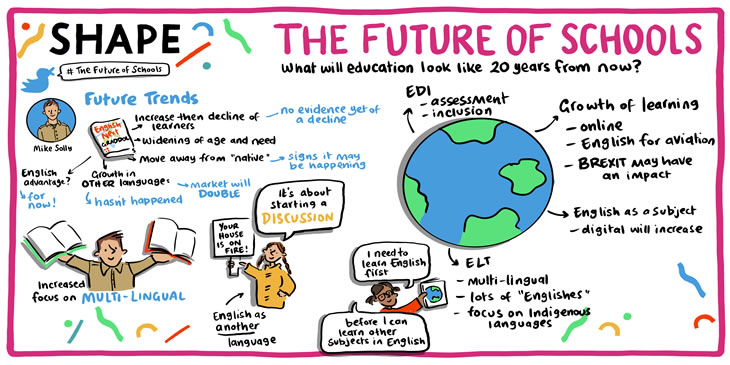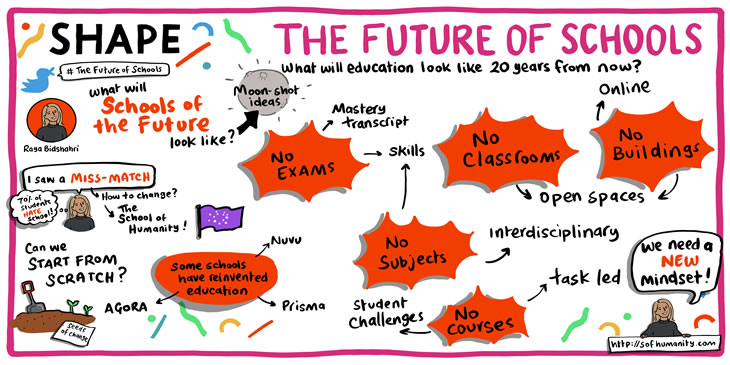On the second day of SHAPE Education: The Future of Schools, we focused specifically on what education will look like in 20 years’ time. Joined by Mike Solly, Raya Bidshahri, and Conrad Hughes, the conversation spanned reflections on the value of predictions in English language teaching, revolutionary and radical thinking for reshaping our understanding of education, and new and emerging factors that will guide our practices over the next 20 years. When thinking about the value of predictions, Mike noted that “it’s not really about getting it right. It’s about starting a discussion” and through SHAPE and in this blog, that’s exactly what we’re aiming to do.
Predictions in English language education: what’s happened and what comes next?

In Mike’s talk, he took a retrospective on Graddol’s future of English (1998) and reflected on whether his predictions have come to pass. Mike talked about how language learners are not declining in numbers and English remains a key language in online contexts. Also, in language education, with the importance of primary, teen, and young adult markets in ELT (English language teaching), and growth in English-medium education in higher education, it appears that few of Graddol’s predictions have come true.
Building on this, Mike’s research on future trends in ELT offered more food for thought on the future of education. His work has predicted a growth in English language learning, specifically online, more importance given to plurilinguistic competences in teachers and learners alike, and, crucially there will be a movement away from “native-speaker norms” towards English-as-a-lingua-franca models. A key area that he argued will shape ELT practices is equality, diversity and inclusion. He stated that there “are big questions marks around morality and ownership” of the English language and with a move towards lingua-franca uses, he said that now “it is really owned by everyone and that is a move towards justice”. Questions of equity and access persisted in Mike’s research, and if you’re interested, his set of 16 predictions are worth checking out in his talk.
Reimagining education: revolutionary and radical thinking

Moving on from Mike’s talk, Raya offered a different perspective. She encouraged us to rethink education asking “What if we started from scratch?”. She didn’t want us to innovate, improve, or develop education. Instead, she wanted us to completely reimagine it. Citing examples of the Agora School in the Netherlands and the Nuvu School in Boston, she presented a vision of education with no exams, classrooms, or curricula. While that may seem quite startling, the alternatives she offered are intriguing and well-grounded in evidence. In lieu of exams, she proposed formative assessments, and project-based and personalised portfolios. Likewise, with no report cards, she argued for the value of skills and mastery transcripts, allowing learners to learn and develop at their own pace. Raya drew on a number of research studies on mastery approaches where education does not need to be constrained to classrooms, to subject and disciplinary foci, or even to school buildings as learning can take place in co-learning or virtual spaces and can centre around skills-based, personalised, and adaptive learning pathways. In closing her talk, she called for a mindset shift in education, arguing “in a world where the only constant is change, we need moonshot ideas” not incremental changes. Her talk contained more details on her School of Humanity and her vision of the future of education.
Reflecting on current practices and future directions
Responding to Mike and Raya, Conrad talked about the challenges he foresaw in realising predictions and changes. With new fads and trends changing practices in education, he has found that we’re adding more to curricula and overloading our students. He noted that he sees more and more students struggling with stress and wellbeing, sociological gaps hampering access and equity, and a need to address challenges in equality, diversity and inclusion. For Conrad, specifically, “how schools are going to grapple with decolonising and indigenising the curriculum is going to have a massive impact on education”.
The event fostered a fascinating discussion on competence-based education and issues of equity, access, and ecology persist as a key theme, building on discussions from Day 1. In terms of assessment, the role of paper-based exams was queried, with attendees wondering if their end was in sight. Mike and Conrad both believe that change in this regard is typically slow but a movement towards computer-based assessment is on the cards. To find out more, check out the recording links above and the fireside chat. Keep any eye out for upcoming blogs too as in the next blog, we’ll be talking about the future of work and education.
SHAPE Education is an initiative supported by Cambridge University Press & Assessment and Cambridge Judge Business School.
References:
Graddol, D. (1998). The future of English. London: The British Council.